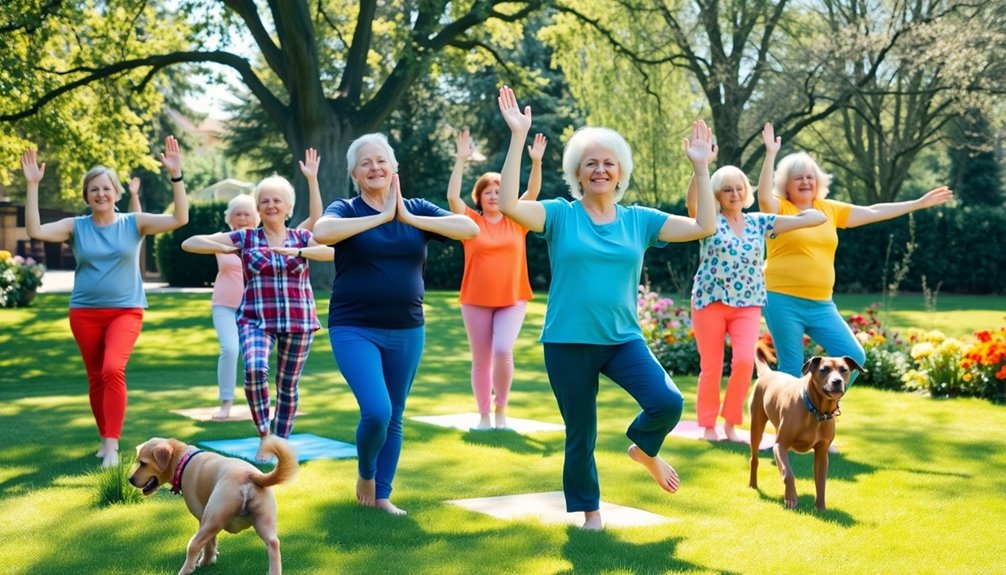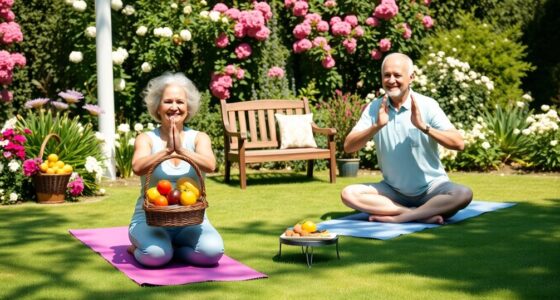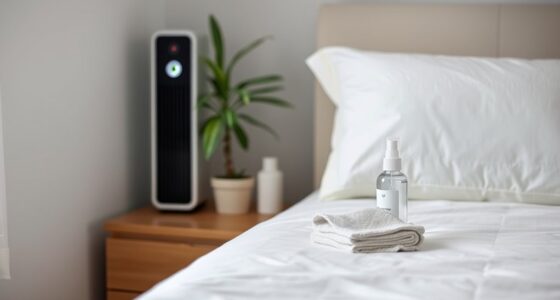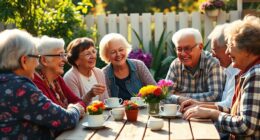Staying active in your golden years can do wonders for your health! It helps prevent chronic diseases, boosts your mood, and keeps your mind sharp. Regular physical activity improves balance, flexibility, and sleep patterns, while also reducing anxiety and stress levels. Plus, it fosters social connections and adds a sense of purpose to your life. Embracing an active lifestyle not only supports longevity but also enhances your overall quality of life. Discover more surprising benefits ahead! Additionally, engaging in regular exercise can significantly enhance your immune system, making it easier for your body to fend off illness. Pairing physical activity with healthy eating is crucial, so be sure to consider some nutrition tips for senior health that can complement your active lifestyle. Together, these practices create a holistic approach to wellness, empowering you to enjoy every moment of your golden years.
Key Takeaways
- Staying active in your golden years reduces the risk of chronic diseases, promoting heart health and stable blood sugar levels.
- Regular exercise enhances cognitive abilities, potentially delaying cognitive decline and reducing the risk of Alzheimer's disease.
- Physical activity improves mood by reducing anxiety and depression, thanks to the endorphins released during exercise.
- Engaging in group activities fosters social connections, reducing isolation and enhancing emotional support from peers.
- Maintaining physical activity improves balance and flexibility, lowering fall risks and boosting confidence in daily activities.
Preventing Chronic Diseases Through Activity
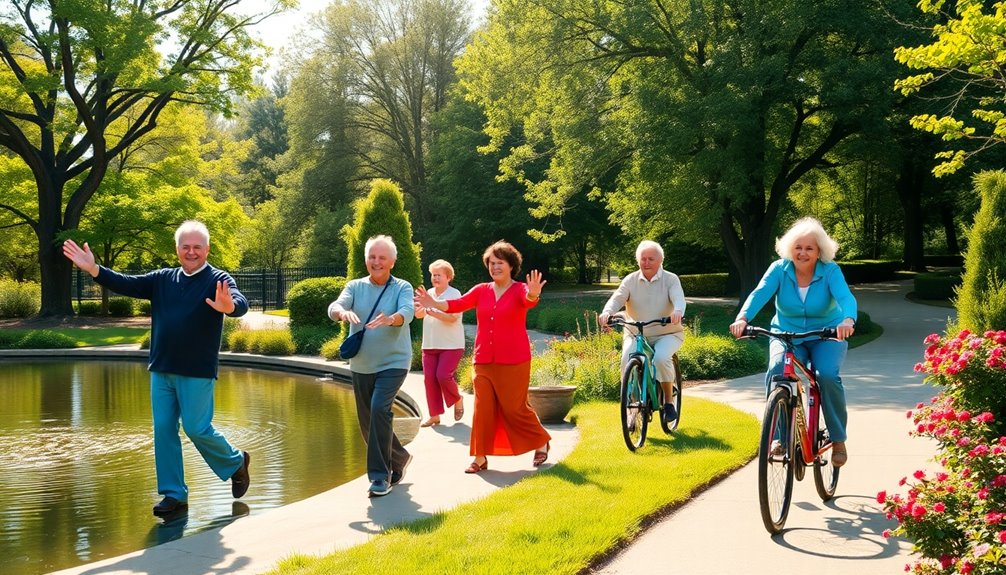
As you age, staying active can significantly reduce your risk of chronic diseases like type 2 diabetes, cardiovascular issues, and certain cancers. Regular physical activity helps manage these conditions, keeping your heart healthy and your blood sugar levels stable. Regular exercise improves balance and flexibility, which is essential for preventing falls and maintaining mobility. Additionally, incorporating herbal teas into your routine may further enhance your overall health by providing calming effects that support stress reduction.
By committing to a routine, you not only lower your risk of heart disease and stroke but also enhance your overall longevity and quality of life. Active older adults often face fewer healthcare costs due to a lower incidence of chronic illnesses.
Engaging in activities like walking, swimming, or even tai chi improves your physical function and mobility, helping you maintain independence. Prioritizing exercise today means you're investing in a healthier tomorrow.
Boosting Mental Health and Mood
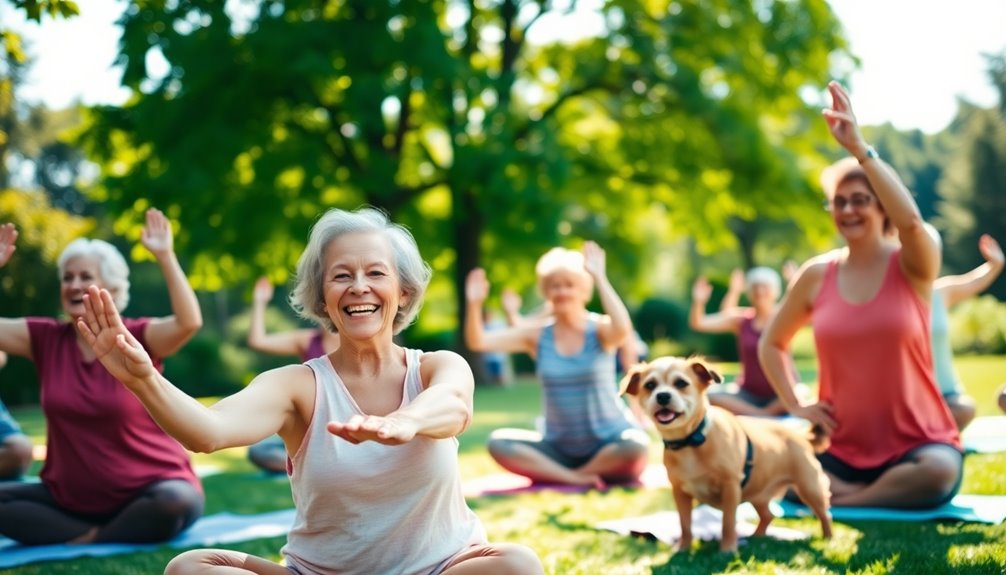
Staying active not only helps with physical health but also plays a significant role in boosting mental health and mood.
Regular exercise reduces anxiety and depression, making you feel more at ease. You'll likely notice improved sleep quality, which contributes to better overall mental well-being. As you engage in physical activities, your body releases endorphins, those natural mood lifters that enhance your emotional state. Engaging in physical activities can help you attract abundance in various aspects of life, including mental clarity and emotional resilience.
Plus, being active often fosters social connections, helping you combat feelings of isolation. This interaction is crucial for maintaining mental health. Additionally, staying active supports cognitive function, potentially delaying cognitive decline and lowering the risk of dementia. Regular physical activity can alleviate feelings of anxiety, insomnia, and depression, contributing to a more positive mindset.
Embracing an active lifestyle truly enriches your golden years!
Enhancing Physical Health and Strength
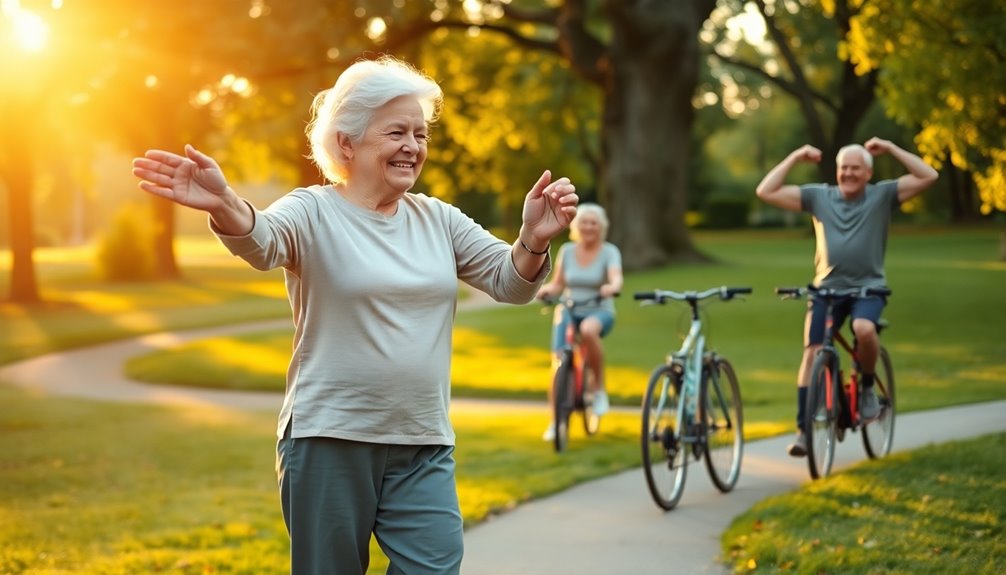
Engaging in regular physical activity significantly enhances your physical health and strength, paving the way for a more vibrant life in your golden years. Exercise plays a crucial role in preventing chronic diseases like heart disease and diabetes, while also maintaining muscle mass vital for your mobility and independence. Additionally, consistent exercise contributes to long-term health benefits, allowing you to enjoy a higher quality of life as you age. Proper nutrition is also essential during this time, as it supports your exercise efforts and overall well-being. By improving balance and coordination, you can reduce the risk of falls and injuries. Strength training supports bone health, preventing bone loss and enhancing density, which lowers fracture risks. Plus, it boosts your cardiovascular fitness, helping to lower blood pressure.
Improving Cognitive Function and Memory
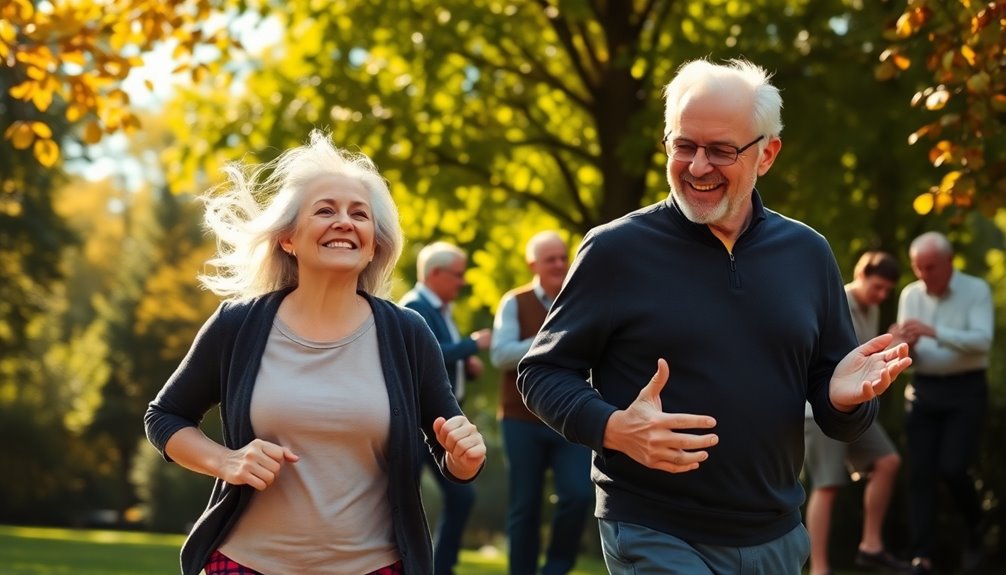
Regular physical activity not only boosts your physical health but also plays a vital role in sharpening cognitive function and memory as you age. Engaging in moderate exercise, ideally between 500 and 999 MET minutes per week, significantly enhances your cognitive abilities. Activities like walking or jogging can increase the size of the hippocampus, which is crucial for memory, while also improving blood flow to the brain. This not only helps in better glucose metabolism but may also reduce the risk of Alzheimer's. Research indicates that specific exercise behaviors positively influence cognitive function, making exercise a potential intervention for dementia prevention.
Supporting Longevity and Quality of Life
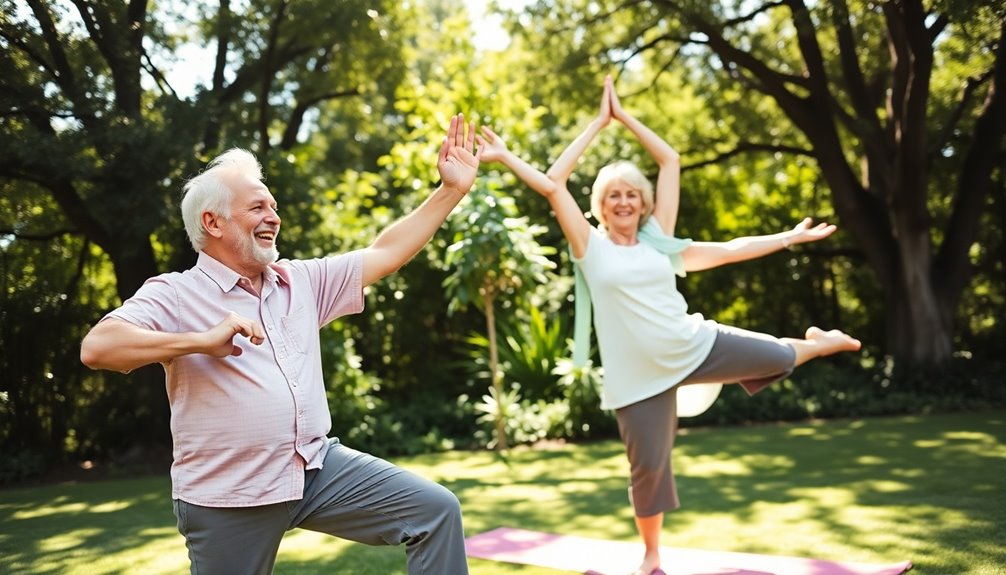
Physical activity isn't just about sharpening your mind; it also plays a key role in promoting longevity and enhancing your quality of life.
Regular exercise lowers your risk of mortality compared to inactive peers, helping you live longer and healthier. By preserving telomeres, exercise can even slow biological aging. Additionally, a study found that the high survival rate of participants engaged in exercise was notably high, indicating the potential benefits of staying active in later years. Engaging in physical activity can also align you with a vibrational state that promotes overall well-being and vitality.
Staying active ensures you maintain functional ability; while regular exercisers lose only 30% of their functionality by age 90, sedentary individuals lose 70%. Engaging in physical activity helps you enjoy daily activities independently, fostering a vibrant lifestyle.
Plus, improved cardiovascular health and reduced risk of chronic diseases contribute to a better quality of life.
With tailored exercise routines, you can add life to your years and truly embrace your golden years.
Building Social Connections and Community
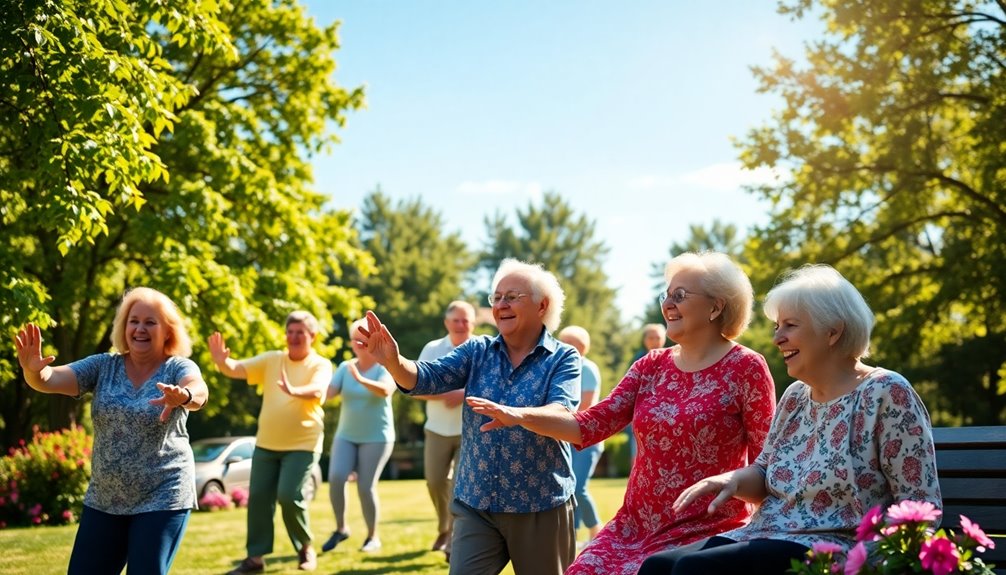
As you navigate your golden years, building social connections can significantly enhance your overall well-being. Engaging in group-based physical activities helps reduce social isolation, fostering friendships and a sense of belonging. Joining community exercise classes not only promotes social interaction but also boosts your mental health by reducing feelings of depression and loneliness. These connections can increase your life satisfaction, making your days more enjoyable. Additionally, social networks support your independence and provide emotional backing, essential for maintaining a positive mindset. Furthermore, regular physical activity has been shown to improve both mental and physical health, making it an essential component of a fulfilling lifestyle. In this context, fostering emotional alignment with friends can further enhance the quality of your interactions and overall happiness.
Reducing Anxiety and Stress Levels
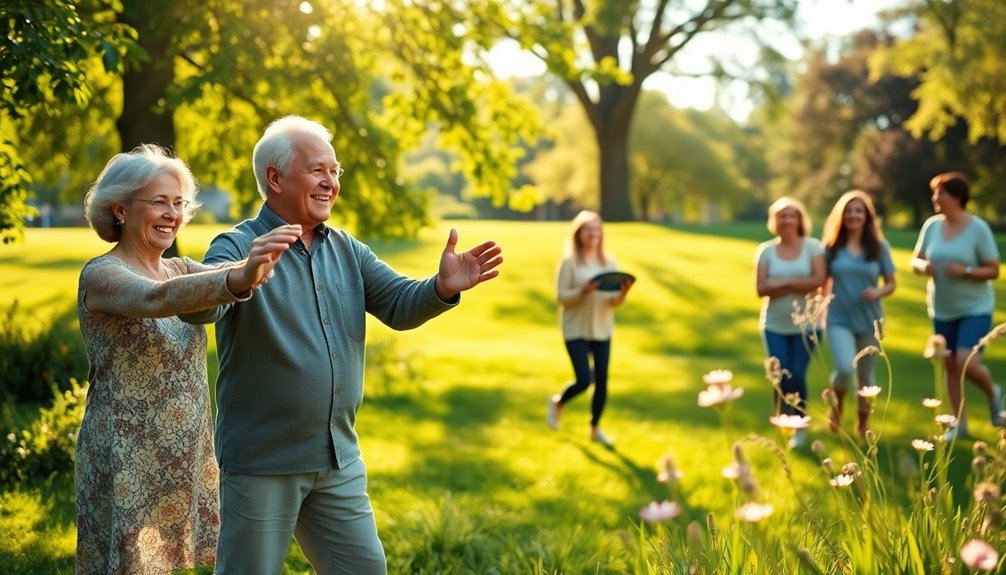
While staying active in your golden years, you'll likely find that engaging in regular exercise can significantly reduce anxiety and stress levels.
Studies show that moderate to high-intensity activities have a greater impact than low-intensity exercises. Aerobic workouts mimic anxiety responses, helping you become accustomed to bodily sensations associated with stress. When you exercise, your body releases endorphins, natural mood lifters that help manage anxiety. Additionally, regular physical activity has been linked to decreased anxiety symptoms in older adults, making it a valuable tool for maintaining mental health.
Mind-body exercises like Tai Chi and yoga also effectively ease anxiety, combining movement with mental focus. Not only does regular physical activity improve sleep patterns and cognitive function, but it also enhances your overall emotional well-being, allowing you to enjoy life more fully.
Maintaining Flexibility and Balance
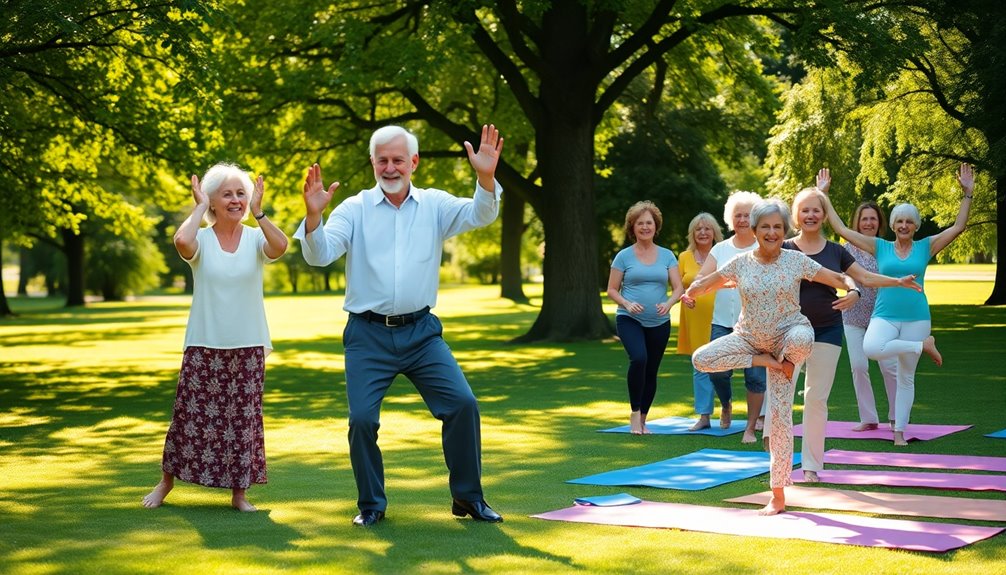
Staying active not only helps reduce anxiety and stress but also plays a pivotal role in maintaining flexibility and balance.
By incorporating regular stretching and low-impact activities like yoga or Tai Chi, you can enhance your mobility and prevent injuries from strains or sprains. Improved flexibility allows you to perform daily tasks with ease and reduces back pain by improving your posture. Additionally, regular stretching exercises can help alleviate common aches and pains, contributing to overall well-being. Engaging in these activities can also lead to better sleep, which is essential for recovery and overall health.
On the balance front, working on your stability significantly lowers your risk of falls, which is crucial for maintaining independence. Plus, better balance boosts your confidence in physical activities.
Encouraging Healthy Sleep Patterns
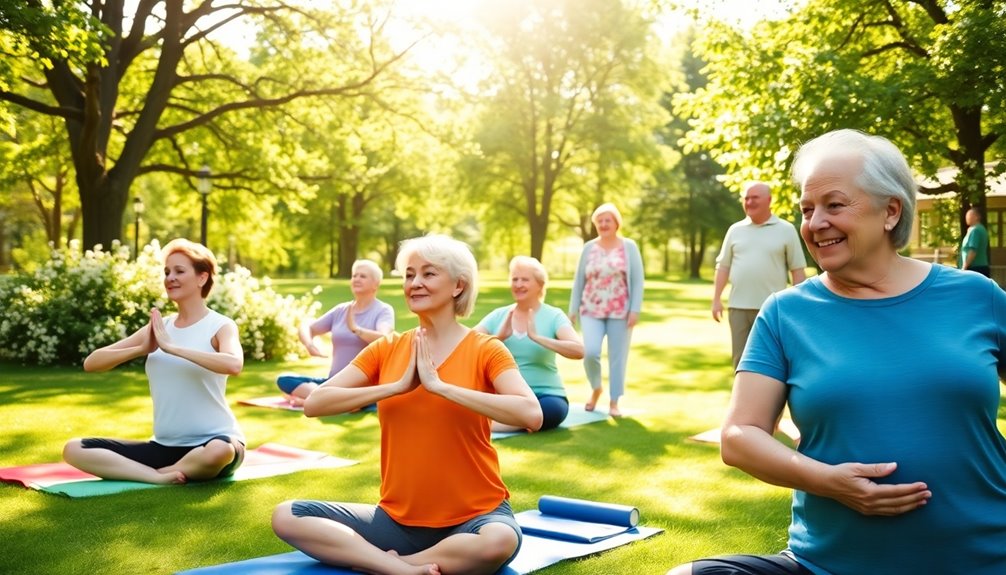
Getting a good night's sleep is essential for maintaining your health and well-being in your golden years. You need 7 to 8 hours of sleep each night, just like other adults.
Many older adults struggle to achieve this, leading to cognitive decline and physical health issues. Regular physical activity can significantly improve your sleep quality, but avoid exercising too close to bedtime. Furthermore, cognitive impairment is significantly associated with short sleep duration, making sleep a critical factor in overall mental health. Proper nutrition is also vital for brain health, as it can influence cognitive function and emotional well-being.
Establishing a consistent sleep schedule and practicing good sleep hygiene, like avoiding caffeine and stimulating activities before bed, can help regulate your internal clock.
If you're facing persistent sleep problems, don't hesitate to consult a healthcare professional for guidance.
Prioritizing restful sleep is crucial for enhancing your overall quality of life as you age.
Fostering a Sense of Purpose and Engagement
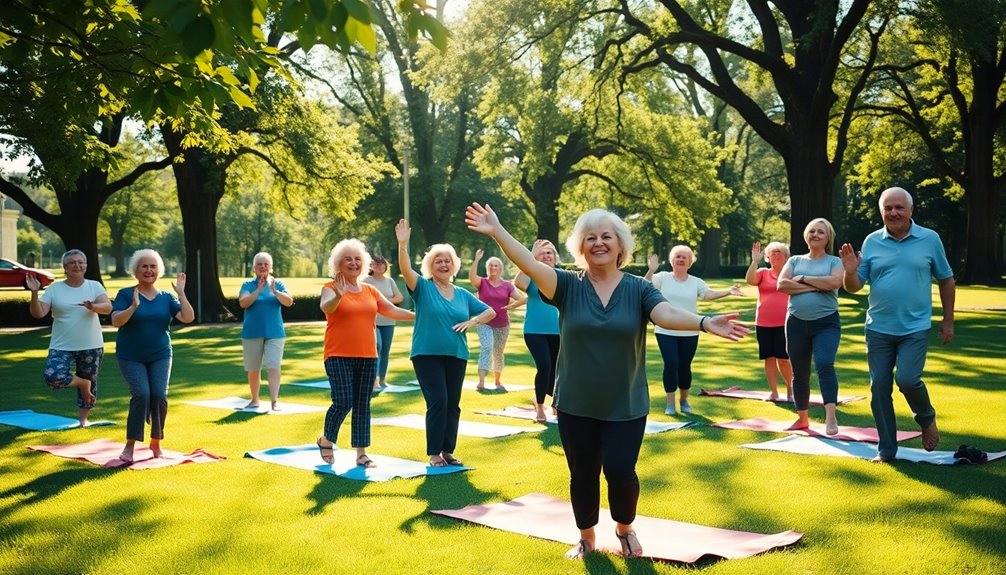
Restful sleep lays the groundwork for a fulfilling life, but it's the sense of purpose that truly ignites your golden years. Engaging in meaningful activities not only motivates you but also fosters vital connections with others. Building these relationships enhances your overall health and happiness. Personal fulfillment and social ties drive you to participate in work or volunteer opportunities. This societal engagement significantly improves your perceived health and reduces cognitive decline. Additionally, studies have shown that societal participation significantly contributes to reduced mortality rates among older adults. Furthermore, awareness of narcissistic behaviors can help individuals navigate relationships, ensuring that social ties remain supportive and positive. Remember, the UN emphasizes your ability to contribute as essential for healthy aging. By immersing yourself in community activities, you create a support network that nurtures belonging and purpose.
Frequently Asked Questions
Can Exercise Help With Chronic Pain Management in Older Adults?
Yes, exercise can definitely help with chronic pain management in older adults.
When you engage in regular physical activity, you improve your musculoskeletal health, which can reduce pain over time. Activities like walking, swimming, or yoga aren't only safe but effective.
They boost endorphins, enhance mood, and even strengthen muscles, helping prevent pain-related disabilities.
What Types of Exercise Are Safest for Seniors With Mobility Issues?
Imagine your body as a well-tuned instrument, where gentle exercises play the melody of mobility. For seniors with mobility issues, low-impact options like walking, swimming, or seated yoga can be your harmonious notes.
Chair exercises, such as leg lifts and arm circles, help strengthen without straining. Always consult healthcare professionals to tailor your routine, ensuring safety and comfort.
How Does Physical Activity Impact Medication Effectiveness in Older Adults?
Physical activity can significantly enhance medication effectiveness in older adults.
When you stay active, you improve circulation and boost metabolism, which helps your body respond better to medications.
Regular exercise also reduces side effects associated with many drugs, making it easier for you to stick to your treatment plan.
Plus, staying active can improve your overall health, potentially reducing the need for certain medications altogether, leading to a more balanced and effective health management strategy.
Are There Specific Exercises for Improving Joint Health in Seniors?
You might think exercise is too strenuous for joint health, but low-impact activities are perfect for you.
Swimming, walking, and cycling strengthen muscles without stressing your joints.
Tai Chi and yoga enhance flexibility and balance, reducing pain.
Regular strength training and mobility exercises support your joints even further.
How Do I Stay Motivated to Exercise Regularly as I Age?
To stay motivated to exercise regularly as you age, focus on activities you enjoy.
Join group classes to build social connections and make exercise fun.
Set achievable goals and track your progress; seeing improvement can boost your motivation.
Incorporate lifestyle activities like gardening or walking your dog, which feel less daunting than structured workouts.
Lastly, consult with your healthcare provider to create a personalized exercise plan that respects your physical limitations.
Conclusion
Staying active in your golden years isn't just about keeping fit; it's a fabulous formula for flourishing. From fighting off chronic diseases to fostering flexibility and focus, movement makes a meaningful difference. Embrace exercise for enhanced energy, elevated moods, and even improved sleep. So, step into a spirited lifestyle and savor the sensational benefits of staying active. Remember, your golden years can shine brighter when you prioritize physical activity—it's time to thrive and enjoy life to the fullest!
References
- https://thegreenfields.org/5-benefits-exercise-seniors-aging-adults/
- https://step2health.com/blogs/news/staying-active-in-your-golden-years-the-key-to-longevity-and-vibrant-living
- https://www.ncoa.org/article/the-life-changing-benefits-of-exercise-after-60
- https://www.angelseniorcare.com/blog-posts/what-you-need-to-know-6-benefits-of-staying-active
- https://odphp.health.gov/myhealthfinder/health-conditions/obesity/stay-active-you-get-older-quick-tips
- https://www.ncoa.org/article/boosting-physical-activity-among-older-adults-strategies-for-senior-centers/
- https://www.fullervillage.org/staying-active-in-your-golden-years-tips-for-leading-a-fulfilling-life/
- https://health.gov/sites/default/files/2023-06/PAG_MidcourseReport_508c_final.pdf
- https://www.nia.nih.gov/about/aging-strategic-directions-research/goal-health-interventions
- https://www.aafp.org/pubs/afp/issues/2010/0101/p55.html
